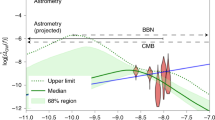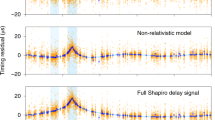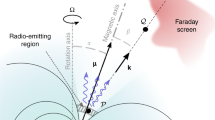Abstract
High-precision pulsar timing measurements have been used1–4 to set upper limits on the flux of ultra-long period (T ⩾ 3 years) stochastic gravitational waves. The data used to produce the current limits appear to be limited by timing noise5,6 that is intrinsic to the pulsars. Recently, however, there have been very low noise timing observations7 of the 1.5-millisecond pulsar8. This suggests that significant sensitivity improvements in searches for ultra-low-frequency (ULF) gravitational waves may be possible. Here the effects of a heretofore secondary noise source—phase scintillations caused by interstellar electron density fluctuations—are calculated and the prospects for improved ULF gravitational wave measurements using pulsar timing are discussed.
This is a preview of subscription content, access via your institution
Access options
Subscribe to this journal
Receive 51 print issues and online access
$199.00 per year
only $3.90 per issue
Buy this article
- Purchase on Springer Link
- Instant access to full article PDF
Prices may be subject to local taxes which are calculated during checkout
Similar content being viewed by others
References
Detweiler, S. Astrophys. J. 234, 1100–1104 (1979).
Hellings, R. W. & Downs, G. S. Astrophys. J. 265, L39–L42 (1983).
Romani, R. W. & Taylor, J. H. Astrophys J. 265, L35–L37 (1983).
Bertotti, B., Carr, B. J. & Rees, M. J. Mon. Not. R. astr. Soc. 203, 945–954 (1983).
Helfand, D. H., Taylor, J. H., Backus, P. R. & Cordes, J. M. Astrophys. J. 237, 206–215 (1980).
Cordes, J. M. & Helfand, D. J. Astrophys. J. 239, 640–650 (1980).
Backer, D. C., Kulkarni, SD. R. & Taylor, J. H. Nature 301, 314–315 (1983).
Backer, D. C. et al. Nature 300, 615–618 (1982).
Lovelace, R. V. E. thesis, Cornell Univ. (1970).
Rickett, B. J. A. Rev. astr. Astrophys. 15, 479–504 (1977).
Armstrong, J. W., Cordes, J. M. & Rickett, B. J. Nature 291, 561–564 (1981).
Armstrong, J. W. & Rickett, B. J. Mon. Not. R. astr. Soc. 194, 623–638 (1981).
Stinebring, D. R. & Cordes, J. M. Bull. Am. astr. Soc. 15, 674 (1983).
Heiles, C. et al. Astrophys. J. Lett. (in the press, 1983).
Estabrook, F. B. & Wahlquist, H. D. Gen. rel Gravit. 6, 439–447 (1975).
Barnes, J. A. et al. IEEE Trans. IM-20, 105 (1971).
Wahlquist, H. D., Anderson, J. D., Estabrook, F. B. & Thorne, K. S. Atti dei Conv. Lincei 34, 335–350 (1977).
Bracewell, R. The Fourier Transform and Its Applications (McGraw Hill, New York, 1965).
Zimmerman, R. L. & Hellings, R. W. Astrophys. J. 241, 475–485 (1980).
Cordes, J. M. & Stinebring, D. R. NAIC preprint 184 (1983).
Author information
Authors and Affiliations
Rights and permissions
About this article
Cite this article
Armstrong, J. Interstellar scintillation and ultra-low-frequency gravitational wave observations. Nature 307, 527–528 (1984). https://doi.org/10.1038/307527a0
Received:
Accepted:
Issue Date:
DOI: https://doi.org/10.1038/307527a0
This article is cited by
-
High-precision timing observations of the millisecond pulsar PSR1937 + 21
Nature (1985)
-
Gravitational interactions of cosmic strings
Nature (1984)
-
Arrival-time analysis for a millisecond pulsar
Journal of Astrophysics and Astronomy (1984)
-
Millisecond pulsars
Journal of Astrophysics and Astronomy (1984)
Comments
By submitting a comment you agree to abide by our Terms and Community Guidelines. If you find something abusive or that does not comply with our terms or guidelines please flag it as inappropriate.



